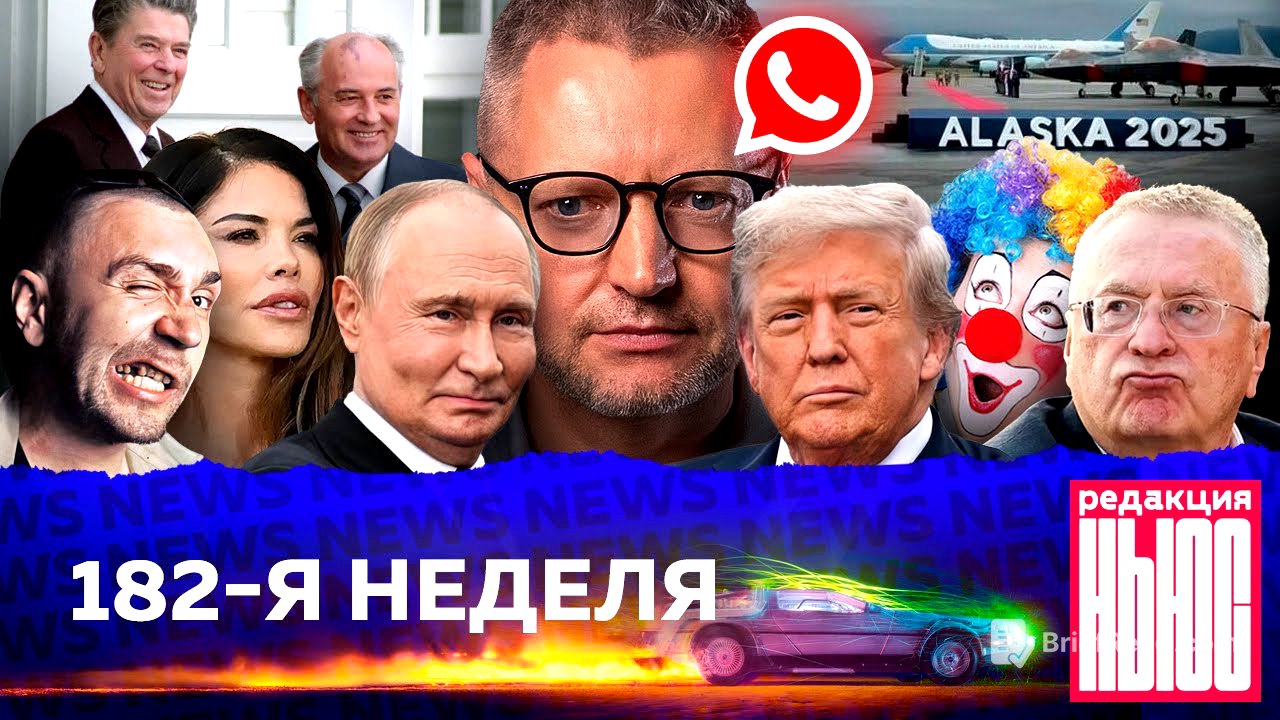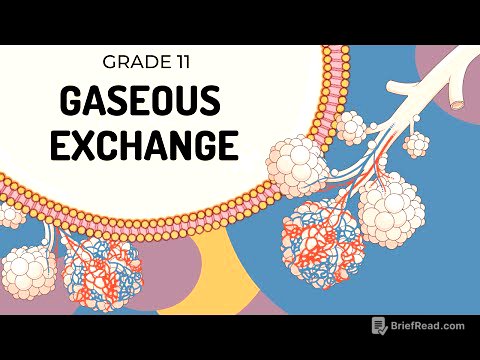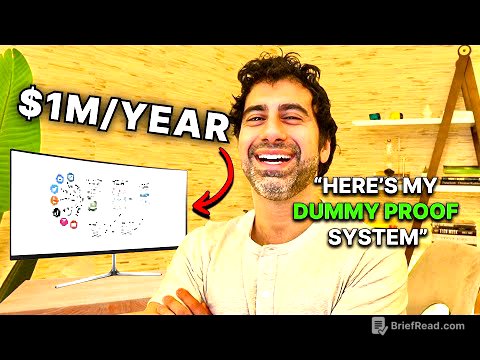TLDR;
This news editorial covers a range of topics, from international politics and military actions to social issues and cultural events in Russia and beyond. Key points include the meeting between Putin and Trump in Alaska, ongoing military developments in Ukraine, restrictions on internet calls and migrant labor in Russia, and even the state of clowning in the world. The video aims to provide a comprehensive overview of the week's events, encouraging viewers to form their own conclusions.
- Putin-Trump meeting in Alaska and its implications for Ukraine
- Military situation in Ukraine, including attacks on Russian rear areas
- Restrictions on internet calls and migrant labor in Russia
- Cultural and social issues, such as banning Leningrad songs and debates over homework
Путин на военной базе США [0:38]
The meeting between Putin and Trump in Alaska took place on a US military base near Anchorage, which was considered an unexpected location. Putin visited Magadan before Alaska, laying flowers at the Alsib heroes' memorial, which commemorates the air route used to ferry US planes to the USSR during World War II. Similarly, he laid flowers at the graves of Soviet pilots upon leaving Anchorage. Foreign Minister Lavrov wore a sweater with "USSR" on it, which can be purchased for 10,990 rubles.
Как Трамп встретил Путина [2:02]
Trump arrived in Anchorage shortly before Putin but remained on his plane, and the two presidents descended separately, meeting on the ground without a formal greeting. The handshake between Trump and Putin lasted 11 seconds. The Western press noted Trump's friendliness towards Putin, suggesting that Putin had an advantage even before negotiations began. Trump said the meeting went "a ten," and Putin appeared pleased in footage taken from Trump's limousine.
«Пока сделки нет». Итоги саммита на Аляске [3:44]
The meeting was held in a 3-team format, with Marco Rubio and Steve Wittkow representing the US side, and Sergei Lavrov and Yuri Ushakov representing the Russian side. Further consultations and lunch were canceled. Putin and Trump addressed the press without taking questions. Putin expressed that Russia views the Ukrainian people fraternally and is interested in ending the conflict, but no complete understanding was reached. Trump stated that there had been great progress and that Zelensky needs to see the deal through.
Трамп пригласил Зеленского в США [5:30]
Trump announced that Zelensky would visit Washington on August 18, potentially followed by a meeting with Putin. Zelensky's reaction to the summit was nervous, with reports describing his call with Trump as complicated. Two alliances appear to have formed: Putin with Trump, and Zelensky with Europe. European leaders expressed concern that Trump might make agreements on Ukrainian territories without Ukraine's participation, receiving assurances from Trump that he would not discuss the territorial issue without them. The EU reiterated the need for guarantees for Ukraine and the impossibility of resolving territorial issues without its participation.
Что с антироссийскими санкциями [8:04]
Washington announced new targeted sanctions against the company A7, which handles international payments for Russian crypto companies, and three Russians suspected of involvement in the Garantex cryptocurrency exchange. The State Department offered a $6 million reward for the capture of the exchange's executives. Trump postponed new tariffs against China for 90 days and confirmed that sanctions against Russia would be postponed for at least 2-3 weeks.
Журналистов разместили на стадионе [9:03]
The choice of Alaska as the meeting location caused logistical challenges, with journalists accommodated at the Sea Wolves stadium due to a shortage of hotel rooms. The US Treasury Department quickly cleared international transactions related to the meeting, and the American embassy in Moscow issued visas to most Kremlin pool journalists within 24 hours. Both Moscow and Washington presented the summit as a victory, with Russian journalists covering the Russian delegation's activities and mocking Kyiv's exclusion from negotiations.
Трамп назвал Аляску Россией? [11:02]
Secretary of State Marco Rubio stated that Trump decided to sort things out personally and look Putin in the eye, referencing Putin's first meeting with George W. Bush in 2001. Trump made slips of the tongue, saying "We are going to Russia" while preparing for Alaska. He also told a story about a Russian general who led troops through fields, getting bogged down in the Rasputitsa, and speculated about the general's fate.
Жириновский всё предсказал? [13:23]
An old prophecy by Vladimir Zhirinovsky resurfaced, predicting a meeting between Putin and Trump in Alaska during which Ukraine would be divided, with only Lviv and five other regions remaining. The rest of Novorossiya would come under the Russian flag.
ВС РФ атакуют под Покровском [14:06]
The meeting in Alaska was viewed in the context of the ongoing military situation. Russian forces have been advancing in the DPR, north of Pokrovsk, potentially threatening supply routes to Slavyansk and Kramatorsk. Ukrainian forces have reportedly transferred additional forces to stop the breakthrough. The situation around Pokrovsk is worsening, with the last store in the city closing. Russia has also been advancing along the Kremennaya Svatova line towards Svyatogorsk and Liman.
Удары по российским тылам [17:00]
Attacks on Russian rear areas have increased, with drones striking industrial enterprises in the Tula and Nizhny Novgorod regions, resulting in casualties. Kursk, Belgorod, and Rostov-on-Don have also been subjected to attacks, causing damage and injuries. For the first time, drones attacked the Kome Republic and Chechnya. Russia has significantly reduced the number of air strikes in the lead-up to the Alaska summit.
Что со звонками в мессенджерах [19:45]
Russians have experienced difficulties with voice and video calls in Telegram and WhatsApp. Mobile operators have been discussing blocking calls in foreign messengers, with Roskomnadzor confirming that partial restrictions have come into force to counter terrorism and extortion. The Ministry of Digital Development stated that access could be restored if Telegram and Meta comply with Russian legislation. WhatsApp stated that it opposes attempts to violate people's right to secure communication.
Россияне скачивают Google Meet и MAX [21:58]
The partial blockade has led to an increase in regular phone calls and traffic to other messengers, with Google Meet and the national messenger Mac gaining popularity. SMS traffic has also increased. Power outages to counter drone attacks have been reported in 60 Russian regions. Sevastopol Governor Mikhail Razvozzhayev warned that mobile internet in Crimea and Krasnodar Krai could become unavailable and recommended using regular calls and SMS.
Суд запретил 5 песен «Ленинграда» [25:34]
The Vasily Ostrovsky District Court banned five songs by the Leningrad group due to Senator Margarita Pavlova's complaint about their cruelty and threat to the spiritual, moral, social, mental, and physical health of minors. Sergei Shnurov, the author of the lyrics, supported the decision, stating that the songs were not intended for an audience under 18 years of age.
Азербайджан выделяет помощь Киеву [26:21]
Azerbaijan continues to demonstrate its readiness for escalation, allocating $2 million to provide humanitarian aid to Ukraine. Since February 22, Baku has sent Kyiv about $40 million in aid. Azerbaijani media outlets are writing that if Moscow continues its aggressive policy against Baku’s interests, then the unofficial embargo on arms supplies to Ukraine will be lifted.
Трамп помирил Баку и Ереван [28:30]
Ilham Aliyev and Nikol Pashinyan signed a declaration of intent at the White House, a preliminary agreement on establishing peace and diplomatic relations between the countries. The corridor discussed in the agreement between Armenia and Azerbaijan will be called the Trump route for international peace and prosperity. The forty-three-kilometer corridor will be leased to the United States for 99 years, and the states will sublease it to a certain consortium that will build railroads, oil, gas, and fiber-optic communication lines.
Приговор калининградским врачам [31:22]
The Moscow Regional Court sentenced neonatologist Ilina Sushkevich and head physician Elena Belaya to nine and nine-and-a-half years of imprisonment for the murder of a newborn. According to the investigation, Belaya instructed Sushkevich to administer a lethal dose of magnesium sulfate to a premature baby to avoid spoiling newborn survival statistics. The accused did not admit guilt, and the medical community has repeatedly spoken out in support of the doctors.
Платное обучение для детей мигрантов [32:56]
An inter-faction bill was introduced to the State Duma, proposing to limit the number of free attempts at testing in Russian and to introduce mandatory paid education for foreigners in Russian schools. Teachers are advised to monitor the children of migrants for any tendency to commit crimes. In Moscow and the Moscow region, testing of Amin's mobile application has been launched, through which labor migrants will be able to send data about a change of residence to the authorities.
Сколько россиян зарабатывают миллион [35:30]
Rosstat shared that the number of Russians with a salary of one million rubles has exceeded 45,000 people, which is only 0.03% of the population of Russia. This statistic specifically refers to salaries, and there are likely many more Russians whose income is one million rubles or more from business. A story went viral about a Muscovite who asked GPT Chat to calculate her chances of meeting a single man in Moscow between the ages of 25 and 40, with specific criteria, and the neural network calculated that there are only 2.5 such men in the capital.
Дума обсуждает отмену домашних заданий [38:06]
The Duma will soon discuss the abolition of homework for schoolchildren, with Speaker Vyacheslav Volodin stating that modern technologies and artificial intelligence turn homework into a formality and a waste of time. One of the proposed options is a system of in-school activities after school. The New York Times published an article about how billionaires and IT company executives have been urging young people to study programming, but major employers are now replacing human workers with artificial intelligence.
Сосискам в тесте не место в школе? [41:34]
An experiment to combat childhood obesity proposed banning hot dogs, doughnuts, and pizza from school cafeterias in the Voronezh region, offering salads, boiled cereals, and healthy snacks instead. However, the Voronezh Ministry of Health refuted the information about the ban, explaining that it was only about developing recommendations for the menu.
55-летняя жена Безоса — новая девушка Бонда? [43:13]
Speculation around the cast of the next James Bond film has flared up, with reports that Jeff Bezos is obsessed with casting his new wife Lauren Sanchez as a Bond girl. According to a comment from one of Amazon MGM's top executives, the fact that Laurence Sanchez is not an actress does not bother Bezs, because when you spend $8 billion, you get what you want. Producers want a British actor under 30 to play the role of Bond himself, and it is unclear how viewers will react to agent 007's companion, who is old enough to be his mother.
Мировая клоунада в кризисе [46:37]
According to the director of the Russian State Circus, Elena Petrikova, world clowning is experiencing a crisis because young clowns can’t find a way to combine tradition and relevance because humor itself has changed. The classic clown has always had a synthetic set of skills, including acrobatics, juggling, training, acting, and elements of stand-up.
Машину времени проектировали в МГУ [48:22]
At the biology department of Moscow State University, for more than 25 years there was an institute for research into the nature of time, which studied teleportation and the possibility of creating a time machine. The institute’s website stopped opening, and the dean of the biological faculty reported that he had never heard of the Institute of Time and that such a structure does not exist. The basis of its activities was holding seminars not only on the nature of time, but also on such scientific categories as extrasensory perception, biolocation and torsion fields.









